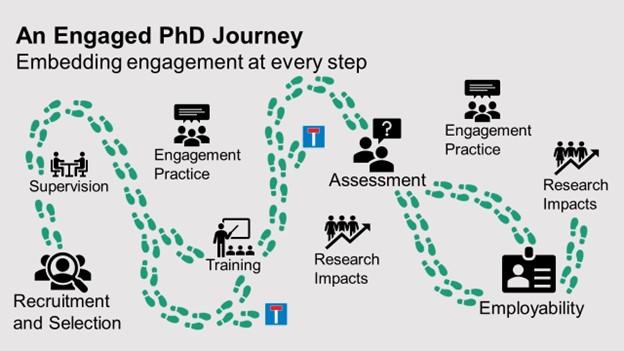Supporting the engaged researchers of tomorrow
Liz Danner, postgraduate researcher at the Open University, ran a provocation session at Engage Online 2023 with colleague Richard Holliman - Professor of Engaged Research at the Open University, Rebekah Smith-McGloin - Director of Research Culture and Environment at Nottingham Trent University, and Ann Grand, Research Fellow & Policy Analyst at the NCCPE, exploring how the sector can support engaged researchers of the future.
Here, Liz blogs about the session and discusses their findings.

For UK universities, engaging with publics and demonstrating beneficial impacts outside of academia have increasingly become markers of ‘research excellence.’ At an institutional level, the Research Excellence Framework (REF) evaluates research quality for the distribution of block funding and will increase the weighting of ‘engagement and impact’ to 25% in the next assessment cycle (REF 29). ‘Engagement, influence, and impact’ also make up a quarter of the knowledge, behaviours, and attributes of research professionals measured in the Researcher Development Framework (RDF).
Despite this national recognition of the value and importance of engaged research, my contention is that support for ‘an engaged PhD journey’ remains highly variable both across and within institutions. Viewing this as a missed opportunity to embed engagement within research practices at the doctoral level, Richard Holliman, Rebekah Smith-McGloin and I brought a key question to Engage 2023 Conference participants- ‘Have developments in engagement and impact outpaced provision for ‘an engaged PhD journey’?’
Engage 2023 Provocation:
Our provocation invited the wider sector to discuss how we can support the engaged researchers of tomorrow during their PhD journey. With facilitation by Ann Grand from the NCCPE, we explored three key areas of the postgraduate experience at the start (recruitment and selection), middle (assessment), and end (employability) of the PhD journey.
Recruitment and Selection:
- What do PhD applicants need to demonstrate to show that they’re ready to embark on an engaged PhD journey?
- What rules and regulations are in place across to the UK sector to inform engaged PhD recruitment and selection?
- What does someone without a doctorate bring to doctoral supervision?
Assessment:
- Does a PhD thesis alone offer an authentic representation of an engaged PhD; what are the alternatives?
- Who routinely assesses, and who else could assess, engaged PhD research?
- What would be the value of an examination team in assessing an engaged PhD?
Employability:
- What measures can support PhD researchers to demonstrate evidence of skills and competencies gained from engagement?
- What measures, other than a thesis, are, or could be, in place to support future job prospects of engaged PhDs?
- How can PhD researchers build on existing approaches to evidence engaged skills and competencies in job applications?
Recognising the range of roles and constituencies which make ‘an engaged PhD journey’ possible, we opened discussion with our own backgrounds and experiences. Within the room we brought a range of perspectives and experiences including doctoral supervisors and students, university professional and academic staff, and public engagement practitioners.
Our discussion concluded that more work is needed to embed engagement practices throughout the PhD journey to enable postgraduate researchers to develop transferable skills, to improve public engagement quality, and to fully embed public engagement practices within research.
Public Engagement for Professional Development:
Engaging public audiences involves and hones a range of transferable skills, including communication, collaboration, and project management. Engagement requires a level of humility and an understanding of the difference between power versus influence in partner relationships.
Offering doctoral candidates an opportunity to showcase these abilities at recruitment and assessment would demonstrate the value of engagement and prepare candidates for future employment. However, within our discussion, only about half of the delegates with experience recruiting doctoral candidates had encountered engagement-specific selection criteria. This was felt to devalue the importance of public engagement as part of the research cycle and engagement skills as part of researcher competencies.
Supporting Quality Public Engagement:
Postgraduate researchers themselves also bring value as new, diverse, and enthusiastic voices in public engagement activities and programmes. Delegates described doctoral candidates as a vital and ‘big piece of the puzzle’ for school outreach programmes to break the stereotype of researchers as ‘pale, male and stale’. However, delegates also identified a need for some researchers to move from ineffective ‘fact-bombing’ to equitable collaboration with interested and affected parties identified through strategic approaches that consider questions of representation, utility and emergence. Our discussion identified a need for both professional training to develop knowledge and opportunities to practise engagement skills with low barriers to entry. Most delegates with doctoral training felt their postgraduate research journey prepared them for a role in engagement.
Postgraduate Engagement for Culture Change:
Embedding engagement at every step of the PhD journey demonstrates the value of public engagement as an expected part of ‘excellent research’, rather a ‘nice to have’ added extra. In this way, delegates viewed postgraduate engagement as part of sector culture change to embed engagement within research practices. Delegates were cautiously positive about the new opportunity to include the work of professional staff and public engagement practitioners in REF 29 submissions as recognition of the value of engagement and engagement staff. However, delegates also identified barriers within current university structures that exclude some voices. Though most delegates felt their engagement and/or academic experience would enable them to examine an engaged PhD, whether universities allow examination by professional staff or external partners is inconsistent. Broadening and diversifying supervision teams and examination panels would expand perspectives and further embed engagement as a core aspect of high-quality postgraduate research training.
Further resources
- Download Provocation Slides
- View Provocation Intro Video
- Explore all the Engage 2023 Provocation videos-
- Read about Equity in Doctoral Education through Partnership and Innovation (EDPI) at Nottingham Trent University
- Find out about Leading Routes work to ‘strengthen the academic pipeline for black students, from a black-led perspective’
